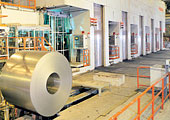 |
| Steel show: Prices on the roll |
After successfully reigning
in cement manufacturers, the government is now desperate to get
steel makers to put a brake on prices. But its efforts seem to
have come to a naught, with steel manufacturers set to raise prices
by Rs 500-1,000 per tonne in April. While on record, R.S. Pandey,
Steel Secretary, stoically maintains that "the industry is
free to decide upon the issue of prices." Sources within
the ministry admit that private steel manufacturers' decision
to reverse the partial rollback, announced earlier in March, has
put them on a collision course with the government. The revision
of prices comes in the wake of an impending global hike to the
tune of $30-50 (Rs 1,320-2,200) per tonne, following China's decision
to lower steel capacity by 35 million tonnes. This rise has also
irked the mining community, already at loggerheads with the steel
manufacturers and the government on the issue of iron ore exports.
"The steel lobby wants to have its cake and eat it too,"
alleges an official of the Federation of Indian Minerals Industry
(FIMI), "first they want us to keep supplying them cheap
ore and then they export steel at global prices." With global
demand of steel expected to rise by 13 per cent during 2007-08,
China and India will become net importers of the commodity, with
the latter expected to import 5 mt of finished steel. Steel makers,
however, are unfazed. "To control inflation, you need sound
fiscal measures and price control is not one of them," says
a steel industry veteran. "Indian steel prices cannot be
divorced from global levels."
-Aman Malik
Ticket,
But No Ride
Is Air Deccan profiting by overbooking flights?
Selling tickets for seats
that don't exist may appear fraudulent, but it's an accepted practice
in the airline industry. Overbooking is justified on the premise
that a few passengers may not show up, but when an airline is
accused of deliberately overbooking flights, then slowing the
lines at check-in counters and, subsequently, offloading passengers-who
don't get refunded-on the pretext of checking in late, it is tantamount
to cheating. News channel CNN IBN has run stories that suggest
India's first budget carrier, Air Deccan, has used such tactics.
The airline denies the charges and says that it will claim damages
of Rs 50 crore by slapping a defamation suit on the channel. "It's
rogue journalism," says Capt G.R. Gopinath, Managing Director,
Air Deccan. "Most airlines overbook on certain routes and
in certain time slots, based on historical data, to optimise seat
usage. But Air Deccan simply does not overbook, as a policy,"
he adds. Gopinath also claims that most of the cases (of passengers
being turned back at the counters) were the result of a software
error. He explains that Air Deccan was using a booking engine
powered and managed by InterGlobe Technologies. "Once the
InterGlobe Group started its own airline (Indigo), we felt vulnerable
because our competition potentially had accesses to all our data,"
says Gopinath. As a result, he adds, the contract between InterGlobe
and Air Deccan was terminated and the airline migrated to a new
system on February 27. InterGlobe Technologies CEO Vipul Doshi
counters by pointing to an Air Deccan statement which said that
"Till February 27, 2007, we have never had a single instance
of overbooking." Gopinath says it may be "more the case
of shoddy work rather than a deliberate attempt," adding
that a legal arbitration has been set into motion between the
two parties.
Industry watchers say typically about 2 per cent overbooking
is done internationally. Says Kapil Kaul, CEO, Centre for Asia
Pacific Aviation India: "Indian budget airlines have not
successfully communicated the value proposition they offer."
Air Deccan will be probed by the Directorate General of Civil
Aviation-something the airline has welcomed.
-T.V. Mahalingam
Steel
Scrap
How much does JSW really owe the
state government?
 |
| JSW's Sajjan Jindal: Blame
game |
Karnataka and the northern
town of Bellary, where steel major JSW Steel has invested around
Rs 15,000 crore in a 7 million tonne (mt) downstream unit, is
metamorphosing into a battleground of sorts between the industrial
conglomerate and the state administration. According to K.H. Patil,
the leader of the Opposition in the Karnataka Assembly and a former
minister, the steel maker hasn't paid around Rs 1,000 crore in
outstanding dues from mining operations conducted by Vijaynagar
Minerals, a joint venture with the public sector Mysore Minerals
(MML). The Karnataka government, meanwhile, estimates the shortfall
more conservatively at around Rs 118 crore, and JSW Steel even
less at just Rs 11 crore. "The government had committed captive
mining production to us, but they allotted mines in Bellary to
state-owned National Mineral Development Corporation instead.
They later saddled us with Mysore Minerals (MML) facilities, which
were nearly defunct," says Vinod Nowal, Executive Director,
JSW Steel.
He contends that not only was the company compelled to develop
these mines (and pay a total of Rs 120 crore to upgrade its infrastructure)
the quality of ore (60-61 per cent iron content, compared to 65
per cent preferred normally) was also sub-standard. JSW Steel
officials say MML had asked for a payment of Rs 180 crore some
months ago, assuming Rs 300 per tonne was levied on the 6 mt mined
by the steel maker. "This charge of Rs 300 is for premium
quality (65 per cent iron content) ore, but what we get is much
lower standard," says Nowal. Already, JSW has paid an upfront
fee based on the net present value (of ore at the site) and in
addition pays Rs 1.10 per tonne to the forest department and Rs
22 per tonne to the state government to operate this mine.
The state government, meanwhile, looks set to dig its heels.
"We are going as per the norms of the MoU we inked with them
and will try to recover our dues," Karnataka's Industries
Minister Katta Subramanya Naidu says.
-Rahul Sachitanand
|






